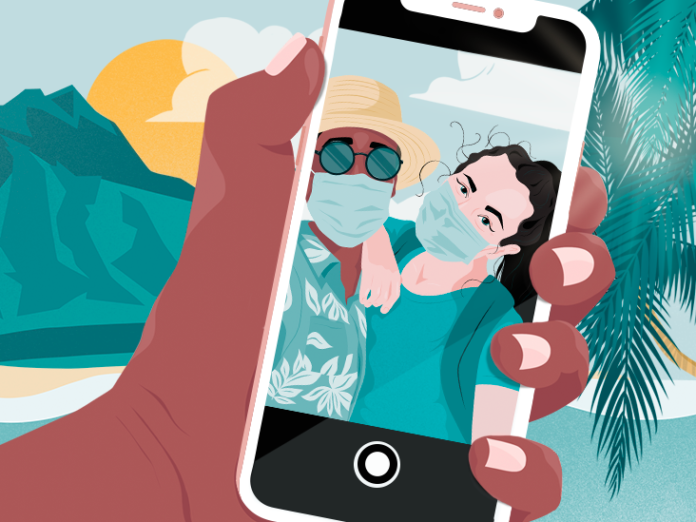Summer is fast approaching. After more than a year of quarantine, many of us are keen to get away. Luckily, many countries are opening once-closed borders and preparing to welcome tourists.
While summer vacations might not feel as carefree as they normally do, they can still be enjoyed with safety guidelines in mind.
If you’re planning to get away in the coming months, the tips below will help set you up for a healthy, happy, and enjoyable summer.
According to a new study by Healthline Media and The Points Guy, a site owned by Healthline’s parent company Red Ventures, 50 percent of U.S. adults are likely to take one vacation this summer.
Those who are vaccinated or planning to vaccinate are the most likely to travel.
“Some Americans may not have had a summer vacation since 2019, and so there’s clearly a lot of pent-up demand,” says Melanie Lieberman, the senior travel editor at The Points Guy.
If you’re vaccinated and traveling, some countries and regions may require you to carry a vaccination passport.
Be sure to look up the current domestic or international travel guidelines to stay informed, and keep your documentation on hand while you travel.
To learn about travel restrictions at your destination, TravelBans.org offers regularly updated restrictions from country to country.
If you aren’t vaccinated, check your destination to ensure vaccination isn’t a requirement before arrival. Most countries still require proof of a negative PCR test, and, in some cases, quarantine on arrival.
The bottom line
- Check whether your destination requires a vaccine passport, negative PCR test, and quarantine.
- Know the domestic and international restrictions.
- Keep your documentation on you at all times.
- Stay up to date with travel restrictions via TravelBans.org.
If your budget allows, upgrading to business or first class could mean less exposure to others. That extra space could reduce your risk of contracting or passing on SARS-CoV-2.
“If you can afford a first-class seat, go for it. You not only have more room during the flight, but you’re also able to get off the plane sooner, which reduces exposure to others,” says Steve Swasey, the vice president of communications at Healthline.
If that’s not an option, flying economy can be done safely by sticking to guidelines and following these tips:
- Wear a mask or two, and change your mask(s) every hour.
- Keep your air vent open to help with air circulation.
- Use hand sanitizer after receiving any items from the flight attendant and when you use and return from the bathroom.
Even after your flight, you’ll want to keep your hand sanitizer close.
Taking a shuttle to the airport, touching the elevator button at the hotel, or grabbing the handrail at an attraction can all increase your exposure risk.
It isn’t a given that sanitizer will be available everywhere you go, so keep it on hand and use frequently.
Make sure the sanitizer you choose is effective and meets safety standards. The Centers for Disease Control and Prevention (CDC) recommends that all hand sanitizers contain at least 60 percent alcohol.
Whether you’re vaccinated or not, keeping a small bottle of hand sanitizer nearby could make the difference between stopping the spread of the virus and passing it on.
If hotels, hostels, or resorts are normally your accommodation of choice, now might be the time to consider something different.
Booking an entire home, cottage, or self-contained apartment is a safer choice for both vaccinated and unvaccinated travelers.
There are ample options for private accommodations listed on travel sites, like Airbnb, Vrbo, and FlipKey.
You can always opt for the outdoors, too.
Of those surveyed, 28 percent said they’d like to go camping this summer. With enclosed spaces posing a greater health threat, there’s never been a better time to explore the outdoors.
Crammed coaches, busy trains, and fully booked flights leave little room for physical distancing. They may even trigger some anxiety after a year of limited contact with others.
If it’s an option, consider renting a car. If you’re using public transportation, check the local guidelines ahead of time to see how each service is ensuring physical distancing.
“Whether you’re staying in a mainstream hotel or riding the airport shuttle, be sure to follow all the best practices for staying safe and protecting others, including doubling up on masks and getting vaccinated as soon as possible,” Lieberman says.
Maintaining physical distancing is key to protecting both yourself and others.
Fifty percent of the potential travelers surveyed said they believe physical distancing rules are important.
Arranging sightseeing activities outside peak hours is one way to dodge the throngs. Outdoor excursions also pose less risk, so consider taking trips to places like beaches and national parks.
Travel insurance is a vacation essential, but it’s especially important this year. It’s often available through your airline when you book your flight, or you can compare travel insurance options online.
Cancel-for-any-reason policies are often more expensive, but they may give you reassurance during this time of uncertainty. Many airlines are currently offering flexible tickets for an additional fee.
“For some travelers, spending more on their first summer vacation since the onset of the coronavirus crisis may also be about securing additional peace of mind,” Lieberman says.
If available, opt for a flexible ticket that you can rebook if you need to.
It’s been a tough year for many people, and a summer vacation can be your opportunity to truly switch off. Think about what you really need from your vacation.
Is it fun and adventure? Rest and relaxation? Or all of the above?
Once you have an idea of what you need, you can plan activities that replenish you.
Of those surveyed, 49 percent want to take a road trip, while 39 percent will be opting for state or national parks. The beach will be the summer destination for 38 percent of respondents, while 28 percent will be attending an outdoor event, like a festival or sports match.
Choose what works for you based on the required safety precautions and your level of comfort mingling with others.
Job layoffs and changing circumstances throughout the past year have put added financial pressure on many.
When it comes to summer vacations, some people are spending big, while others are unable to spend anything extra on vacations at all.
According to the survey, 43 percent of respondents anticipate spending more than $1,000, while 20 percent think they’ll spend more than $2,000.
“Nearly half of prospective travelers plan to spend more than $1,000 on their summer vacations, which indicates they’re ready to make up for lost time by spending more for bigger trips,” Lieberman says.
The study also found that the most common reason not to travel this summer is financial constraints, with 41 percent of respondents saying they simply can’t afford it.
If spending big will cause you added stress, consider more budget-friendly ways to tap into that vacation feeling.
Road trips, short weekend breaks, and destinations close to home can help you to keep costs down. And there are always staycations or personal retreats.
Summer getaways are often a time for spontaneity, but it may be wise to plan in advance this year.
Whether you’re heading to the beach, a theme park, or a restaurant, some attractions will likely require you to book a slot before going.
It can be helpful to do some research first. Make a list of the attractions you want to visit, and find out if they have a booking system in place. That way, there won’t be surprises when you arrive.
And if you’re concerned about safety, call ahead to know for sure.
Many survey respondents (48 percent) are concerned about strict cleaning protocols at attractions, such as wiping down and cleaning seats, rides, and tables.
If it puts your mind at ease, check in to see what protocols your destination has in place.
You’ll want to pack plenty of face masks to keep yourself and others safe. Change your mask frequently and keep extras on hand in case you lose or damage them.
Wearing a face mask doesn’t just protect you. It helps put others at ease — with 48 percent of survey respondents reporting that mandated face masks are an important safety measure to them.
If you find wearing a face mask for extended periods difficult, consider finding one with a more comfortable fit.
If a cloth mask feels heavy or oppressive, consider a thinner, lighter disposable face covering. If ear loops bother you, look for a face covering that ties behind your head.
Another option for those sensitive to fabric on their face is a plastic face shield, which don’t come into contact with the face at all.
It’s important to note that the CDC doesn’t recommend face shields. Still, they may be the only option for some individuals, like those with heightened sensitivities due to autism or sensory processing difficulties.
Whichever kind of mask you choose, take the time to break it in before you travel. This will help you get used to the mask and ensure you can tolerate it for long periods of time.
Even if you’re vaccinated, wearing a face covering helps keep others safe and feeling secure. If you’re exempt from wearing a face mask, make sure you carry medical proof.
The bottom line
- Try different mask options that you can wear for long periods of time.
- Pack multiple masks and change them frequently.
- While face shields may be the only option for individuals with sensitivities, they aren’t recommended by the CDC.
- If you have a medical exemption to wearing a mask, carry proof with you.
Wherever you’re traveling to, you’re likely to encounter different COVID-19 protocols.
Whether it’s wearing a face mask, maintaining physical distancing, or sanitizing your hands, preparing in advance can help ensure these safety measures don’t put a damper on your time away.
Consider organizing everything you need well in advance. Stock up on extra face masks before you go, and take a few travel-size bottles of sanitizer with you.
Keep your documentation of your PCR tests, vaccinations, and medical conditions on hand. You can keep them in a folder for easy access when needed.
While many countries, like the United Kingdom and France, offer COVID-19 contact tracing apps, they aren’t considered effective unless a critical mass of people use them. Still, it doesn’t hurt to research the app for the country you’re traveling to and download it.
Be sure to review the current guidelines for your modes of transportation and those at your destination.
For extra preparedness, make a note of all the guidelines and keep them with you while you’re away. This can help give you extra peace of mind.
The bottom line
- Be prepared with all your safety supplies on hand.
- Carry a folder with your medical papers, PCR test results, and proof of vaccination.
- Download a contact tracing app for the country you’re traveling to.
After the year that’s passed, you may feel like you need a summer vacay now more than ever.
“The most important aspect of traveling is to always stay safe and healthy. No one wants their vacation to be spoiled by being ill,” says Laurie Dewan, the vice president of brand, insights, and communications at Healthline.
And, no matter your vaccination status, keep up those safety precautions.
“Even if you’re vaccinated, it’s still a good idea to wear a mask, stay 6 feet from others, avoid crowds, and wash your hands frequently. This is good advice for staying healthy, even if we’re not in a pandemic,” Dewan says.
If you’re planning on getting away, doing a little extra prep and planning could be the key to a healthy, happy summer.
Victoria Stokes is a writer from the United Kingdom. When she’s not writing about her favorite topics, personal development, and well-being, she usually has her nose stuck in a good book. Victoria lists coffee, cocktails, and the color pink among some of her favorite things. Find her on Instagram.













